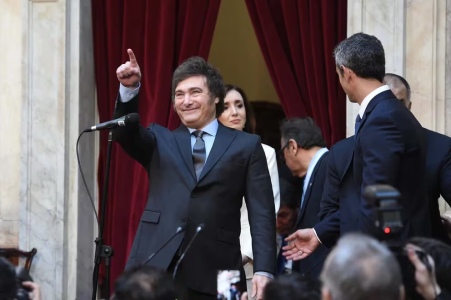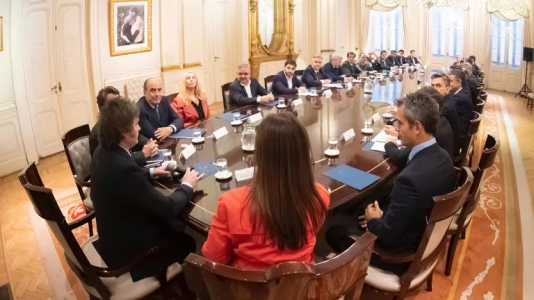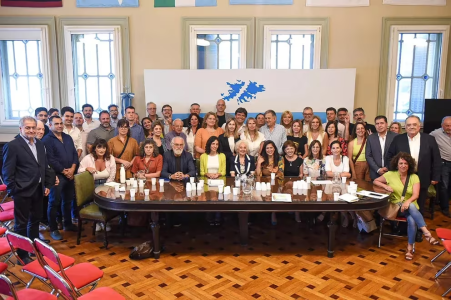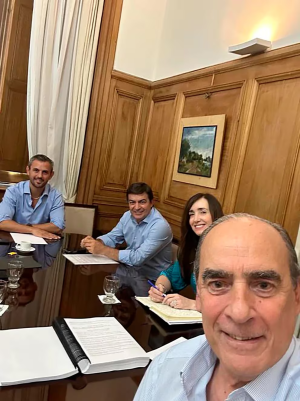Javier Milei presses for the Omnibus Law to be issued quickly and without changes, but the opposition resists and asks to negotiate - Infobae

Source:

 www.infobae.com
www.infobae.com
January 04, 2024
By Joaquín Múgica Díaz

Javier Milei together with Victoria Villaruel and Martín Menem, the main negotiators in Congress (Argentine Senate)
The request from Javier Milei to his deputies was concrete. Without room for doubts or interpretations. He wants the omnibus law to be approved as it was sent to Congress. It is a utopia. Almost everyone knows it. From the official legislators to the different sides of the opposition. For the super project to come out, the Government is going to have to negotiate. Yes or yes. There is no room not to do it. Otherwise the law will not come out.
The President trusts that a group of governors will accompany him because of their willingness to support the changes and others will do so in order to restore the Income Tax. “They want profits, support the laws”, he told the leaders in the only meeting he had since he took office. Some felt it as a threat. Others as a logical pressure of negotiation.
One of the governors of Unión por la Patria (UP) most inclined to negotiate with the Government put a stop to that possible support. “We do not support a law that delegates legislative powers. That is not negotiated with anything. I hope he reconsiders because what he is doing is not in anyone's interest,” he stated when asked by Infobae. The hardest wing of the Peronists directly rejects the entire law.

Javier Milei trusts that he will have the support of a group of governors to pass the omnibus law
The governors of Together for Change are more enthusiastic about supporting the law but with some changes. The majority is not willing to do it as it was sent to Congress. That is why it is very difficult for the project to come out without modifying some articles. It is only a speech that can serve to pressure but when it reaches the parliamentary level it is diluted due to its inconsistency.
For radicalism, which has four governors and an important bloc of legislators, there are some issues that are impossible to vote on. The delegation of powers from the Legislative Branch to the Executive, nor the suspension of retirement mobility and the increase by decree, nor the increase in withholdings does not pass this filter. Nor, in the words of a radical legislator, will they be given “a blank check for the privatization of State companies”, since they believe that it should be discussed “case by case”.
Milei wants the law to come out as quickly as possible. The deadline is January 31. But in Congress, opposition legislators warn that the times are unviable. Only next week could the project be discussed in the four commissions that the president of the lower house, Martín Menem, enabled last night: Budget and Finance, Constitutional Affairs, General Legislation and Foreign Relations.
 drive.google.com
drive.google.com
In Peronism there is a lot of anger about the way the ruling party is being handled. Just yesterday at 11:35 in the morning - in a period that is not the usual one - the presidency led by Menem sent Germán Martínez , president of the block of UP deputies, the request to send the members of those commissions, which were informed yesterday at 8:30 p.m. In the previous hours, the ruling party had announced that the Impeachment Commission was also going to be formed, but in the end it was not done.
The ruling party imposed on Peronism that the formation be made with the result that the d'hondt system gives with respect to the representative one that exists in the lower house, minus one. The UP block contains 40% of the chamber. That percentage, minus one legislator, is what he got on the benches of the commissions that will be formed starting this noon and that, according to La Libertad Avanza (LLA), they will discuss the law next week.
In the session of December 7, it had been voted that the ordering was going to be done only with the d'hondt system, which is why the discomfort in the majority bloc of the opposition is varied. In all those that were established, they lost a legislator. “There is a lot of sloppiness and disorder among them”, highlighted an important opposition legislator, due to the delay in sending the call.

The deputies of Unión por la Patria together with Estela de Carlotto and the Human Rights organizations (Source)
In addition, Peronism demands that the law go through more commissions but, at this point, they know that the demand will not have an effect. The rest of the opposition blocs, where the Civic Coalition, the UCR, socialism, the PRO and Cordoba Peronism coexist, have already endorsed the treatment of those ordered by Menem. Less commissions, less treatment time. And, a priori, more chances that the law will come out more quickly.
If they had any hope of obtaining opposition support to request that it be discussed in more commissions, it ended yesterday when the We Make Federal Coalition bloc, which brings together 23 legislators and presides Miguel Pichetto, issued a statement in which they assured that the will is to accompany the project although not "with a closed book", and that they accept the treatment in the commissions arranged by the ruling party. a>
“It is impossible for this project to happen as it is. We are not going to give Milei a blank check, but we are willing to work and find agreements”, one of the legislators who is part of the scheme led by the man from Rio Negro and that appears on the parliamentary stage as an important block to negotiate the quorum and some laws. The big problem they see is the lack of willingness to negotiate on the part of the Government. Surprise and resignation.
The Peronist deputies will go today to the commissions that agree with the desire to make public the claim that it is necessary for the project to go through more commissions, due to the magnitude and significance of the extensive document. They also believe that they will discuss the project and block it in the chamber when the time for debate arrives because they will obtain a majority to do so. Projections in the midst of a rarefied climate.

The photo that the Minister of the Interior, Guillermo Francos, uploaded to his social networks
Yesterday afternoon the Peronist deputies met on the third floor of the Chamber of Deputies with Estela de Carlotto and Human Rights organizations. At that meeting, the bill was repudiated and the Government was accused of “wanting to concentrate all power” and “subjugate the rights of Argentines.” The organizations criticized “the criminalization of social protest.” Afterwards there was a meeting of the UP block in which they were organized for the debate that begins today with the formation of the commissions. They are united and organized.
In the Deputies annex, after 4 p.m., there was a meeting of the PRO bloc, which is willing to support the law as it was sent. It is the space most aligned with the national government although not all legislators are affiliated with the hard line. “We are going to give strong support to President Milei's government”, said after the meeting the deputy Hernán Lombardi, very close to Patricia Bullrich and Mauricio Macri.
Another important meeting took place at the Ministry of the Interior, where the minister Guillermo Francos received the vice president, Victoria Villaruel; to the secretary of parliamentary relations, Omar De Marchi, and Martín Menem. The four sharpened their pencil to find out what the chances are that the omnibus law will pass the filter of Congress and how they can gather votes among the governors. They are enthusiastic. At this point it seems to be a matter of conviction.
The President seeks to get the law out quickly and without changes. An important part of the opposition, where the fragments of Together for Change are, asks to open the game, negotiate and find a point of agreement to accompany. They look for arguments to give Milei governability. Peronism and the left have already planted the flag of resistance and are analyzing how to stop approval. Next week the law will begin to move through the committees. They all promise a fierce debate. Discussion time. Perhaps, also, time for negotiation and consensus. We'll see.

Source:

Javier Milei presiona para que la Ley Ómnibus salga rápido y sin cambios, pero la oposición resiste y pide negociar
El Presidente cree que contará con el apoyo de un grupo de gobernadores y reclama celeridad para que el proyecto se apruebe en enero. Los bloques opositores están divididos y anticipan que la única forma de que salga es modificar artículos
January 04, 2024
The President believes that he will have the support of a group of governors and demands speed for the project to be approved in January. The opposition blocs are divided and anticipate that the only way to get it out is to modify articles
By Joaquín Múgica Díaz

Javier Milei together with Victoria Villaruel and Martín Menem, the main negotiators in Congress (Argentine Senate)
The request from Javier Milei to his deputies was concrete. Without room for doubts or interpretations. He wants the omnibus law to be approved as it was sent to Congress. It is a utopia. Almost everyone knows it. From the official legislators to the different sides of the opposition. For the super project to come out, the Government is going to have to negotiate. Yes or yes. There is no room not to do it. Otherwise the law will not come out.
The President trusts that a group of governors will accompany him because of their willingness to support the changes and others will do so in order to restore the Income Tax. “They want profits, support the laws”, he told the leaders in the only meeting he had since he took office. Some felt it as a threat. Others as a logical pressure of negotiation.
One of the governors of Unión por la Patria (UP) most inclined to negotiate with the Government put a stop to that possible support. “We do not support a law that delegates legislative powers. That is not negotiated with anything. I hope he reconsiders because what he is doing is not in anyone's interest,” he stated when asked by Infobae. The hardest wing of the Peronists directly rejects the entire law.

Javier Milei trusts that he will have the support of a group of governors to pass the omnibus law
The governors of Together for Change are more enthusiastic about supporting the law but with some changes. The majority is not willing to do it as it was sent to Congress. That is why it is very difficult for the project to come out without modifying some articles. It is only a speech that can serve to pressure but when it reaches the parliamentary level it is diluted due to its inconsistency.
For radicalism, which has four governors and an important bloc of legislators, there are some issues that are impossible to vote on. The delegation of powers from the Legislative Branch to the Executive, nor the suspension of retirement mobility and the increase by decree, nor the increase in withholdings does not pass this filter. Nor, in the words of a radical legislator, will they be given “a blank check for the privatization of State companies”, since they believe that it should be discussed “case by case”.
Milei wants the law to come out as quickly as possible. The deadline is January 31. But in Congress, opposition legislators warn that the times are unviable. Only next week could the project be discussed in the four commissions that the president of the lower house, Martín Menem, enabled last night: Budget and Finance, Constitutional Affairs, General Legislation and Foreign Relations.
20243.PDF
 drive.google.com
drive.google.com
In Peronism there is a lot of anger about the way the ruling party is being handled. Just yesterday at 11:35 in the morning - in a period that is not the usual one - the presidency led by Menem sent Germán Martínez , president of the block of UP deputies, the request to send the members of those commissions, which were informed yesterday at 8:30 p.m. In the previous hours, the ruling party had announced that the Impeachment Commission was also going to be formed, but in the end it was not done.
The ruling party imposed on Peronism that the formation be made with the result that the d'hondt system gives with respect to the representative one that exists in the lower house, minus one. The UP block contains 40% of the chamber. That percentage, minus one legislator, is what he got on the benches of the commissions that will be formed starting this noon and that, according to La Libertad Avanza (LLA), they will discuss the law next week.
In the session of December 7, it had been voted that the ordering was going to be done only with the d'hondt system, which is why the discomfort in the majority bloc of the opposition is varied. In all those that were established, they lost a legislator. “There is a lot of sloppiness and disorder among them”, highlighted an important opposition legislator, due to the delay in sending the call.

The deputies of Unión por la Patria together with Estela de Carlotto and the Human Rights organizations (Source)
In addition, Peronism demands that the law go through more commissions but, at this point, they know that the demand will not have an effect. The rest of the opposition blocs, where the Civic Coalition, the UCR, socialism, the PRO and Cordoba Peronism coexist, have already endorsed the treatment of those ordered by Menem. Less commissions, less treatment time. And, a priori, more chances that the law will come out more quickly.
If they had any hope of obtaining opposition support to request that it be discussed in more commissions, it ended yesterday when the We Make Federal Coalition bloc, which brings together 23 legislators and presides Miguel Pichetto, issued a statement in which they assured that the will is to accompany the project although not "with a closed book", and that they accept the treatment in the commissions arranged by the ruling party. a>
“It is impossible for this project to happen as it is. We are not going to give Milei a blank check, but we are willing to work and find agreements”, one of the legislators who is part of the scheme led by the man from Rio Negro and that appears on the parliamentary stage as an important block to negotiate the quorum and some laws. The big problem they see is the lack of willingness to negotiate on the part of the Government. Surprise and resignation.
The Peronist deputies will go today to the commissions that agree with the desire to make public the claim that it is necessary for the project to go through more commissions, due to the magnitude and significance of the extensive document. They also believe that they will discuss the project and block it in the chamber when the time for debate arrives because they will obtain a majority to do so. Projections in the midst of a rarefied climate.

The photo that the Minister of the Interior, Guillermo Francos, uploaded to his social networks
Yesterday afternoon the Peronist deputies met on the third floor of the Chamber of Deputies with Estela de Carlotto and Human Rights organizations. At that meeting, the bill was repudiated and the Government was accused of “wanting to concentrate all power” and “subjugate the rights of Argentines.” The organizations criticized “the criminalization of social protest.” Afterwards there was a meeting of the UP block in which they were organized for the debate that begins today with the formation of the commissions. They are united and organized.
In the Deputies annex, after 4 p.m., there was a meeting of the PRO bloc, which is willing to support the law as it was sent. It is the space most aligned with the national government although not all legislators are affiliated with the hard line. “We are going to give strong support to President Milei's government”, said after the meeting the deputy Hernán Lombardi, very close to Patricia Bullrich and Mauricio Macri.
Another important meeting took place at the Ministry of the Interior, where the minister Guillermo Francos received the vice president, Victoria Villaruel; to the secretary of parliamentary relations, Omar De Marchi, and Martín Menem. The four sharpened their pencil to find out what the chances are that the omnibus law will pass the filter of Congress and how they can gather votes among the governors. They are enthusiastic. At this point it seems to be a matter of conviction.
The President seeks to get the law out quickly and without changes. An important part of the opposition, where the fragments of Together for Change are, asks to open the game, negotiate and find a point of agreement to accompany. They look for arguments to give Milei governability. Peronism and the left have already planted the flag of resistance and are analyzing how to stop approval. Next week the law will begin to move through the committees. They all promise a fierce debate. Discussion time. Perhaps, also, time for negotiation and consensus. We'll see.

